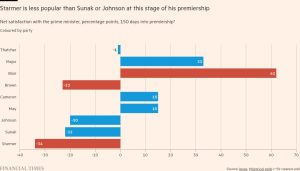Trump tariffs a bigger concern than martial law crisis, says Korean central bank chief
Unlock the Editor’s Digest for free
Roula Khalaf, Editor of the FT, selects her favourite stories in this weekly newsletter.
South Korea’s export-oriented economy is in greater jeopardy from Donald Trump’s trade policies than from the political crisis unfolding at home, the country’s central bank governor has said.
In an interview with the Financial Times, Bank of Korea governor Rhee Chang-yong acknowledged that “critical structural reforms” to the South Korean economy and financial markets would be delayed as a result of the fallout from President Yoon Suk Yeol’s failed attempt this week to impose martial law.
But he said the economic impact of the political crisis in Seoul would be “limited” when compared with the potential consequences for Korean exporters of intensifying Chinese competition and the hefty tariffs Trump is expected to impose on leading trade partners of the US.
“There is a lot of uncertainty,” Rhee said. “But compared with domestic factors, the external factors are giving us a lot more uncertainty at the moment.
“[Trump’s tariff threat] is one of the main reasons why we downgraded our growth forecast for this year and next year,” Rhee added.
“Export growth was performing well this year, but now we have revised our export growth [projections] downwards for two reasons,” he said. “One is possible tariffs, and the other is that we find that China’s competitiveness is really growing fast, and China’s oversupply of goods within China as well as outside of China is growing very fast.”
Even before this week’s political drama, South Korea’s economy, Asia’s fourth largest, was wrestling with weak domestic demand and high household debt in addition to increased competition from Chinese exporters. Last week, the central bank cut interest rates unexpectedly, with the governor citing concerns over the ‘red sweep’ in the US, referring to Trump’s victory and Republican gains.
But Rhee stressed that the impact of Yoon’s martial law gambit on the country’s financial markets had been “shortlived and relatively muted”.
After Yoon announced his decree on Tuesday evening, the offshore South Korean equity market index dropped more than 6 per cent, while the won weakened almost 3 per cent against the dollar.
But after an emergency late-night meeting with the finance minister and chief financial regulators, Rhee pledged to deploy “unlimited” liquidity in the country’s financial markets if necessary.
By the time trading opened the following morning in Seoul, Yoon had announced his intention to revoke his martial law order. Investors have remained relatively calm despite the turmoil, with the country’s Kospi stock benchmark down 6 per cent by close of trading on Thursday from Tuesday’s close.
“[Our] swift and comprehensive prevention measures calmed and stabilised the financial market with rapid speed,” Rhee said.
South Korea is bracing itself for prolonged political turmoil, with Yoon facing an impeachment vote in the country’s National Assembly on Saturday. But Rhee noted the South Korean economy had ridden out two presidential impeachment dramas in recent memory, in 2004 and 2017.
The governor said he had been “excited” by an emerging political consensus on the need to strengthen protections for minority shareholders in listed Korean companies, although he conceded the government’s corporate governance drive would be delayed by the political crisis.
But he rejected the argument made by some observers this week that Yoon’s decree and the resulting crisis had vindicated index-makers such as MSCI, which have resisted calls in South Korea for the country to be upgraded to developed market status.
“I can understand if you say [South Korea’s developing market status] is because of the North Korea problem, or because of our capital controls. But I have never heard the people from MSCI say: ‘This is because your democracy is not mature enough,’” Rhee said.
#Trump #tariffs #bigger #concern #martial #law #crisis #Korean #central #bank #chief






